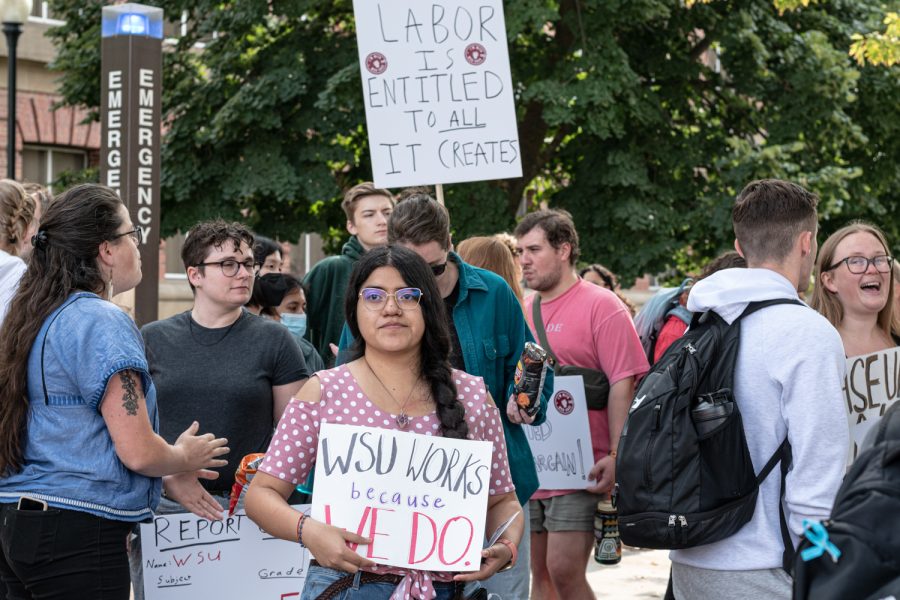Academic student employees make progress in unionization efforts
Students still face health insurance, cost of living issues this fall
WSU CASE members hold a rally along Terrell Mall, Sep. 14.
September 28, 2022
Academic student employees are one step closer to unionizing and securing higher wages, better healthcare and protection from discriminatory environments.
WSU Coalition for Academic Student Employees received word Tuesday night that more than 50% of ASEs support the effort to unionize, submitting their signatures in favor of the union, said Claudia Skinner, doctoral candidate in American studies and culture.
“We stand for and with each other regardless of whether you’re an ASE or not,” she said. “Every single one of us at WSU — we make WSU what it is. We can’t leave each other behind when we know that people are experiencing unfair labor [conditions], are not receiving a living wage, are facing discrimination and harassment.”
Now, the Public Employment Relations Commission will verify ASE’s signatures against WSU employment records with physical copies of their signatures in a cross-check process. WSU must provide the records within 10 days and inform PERC if it needs an extension to obtain them by Thursday, Skinner said.
WSU does not see this step as a barrier, but compiling student signatures will be somewhat difficult, said Phil Weiler, WSU vice president for marketing and communications.
“We don’t keep people’s signatures on file per se, so it would be probably a process to have to reach out to everybody and say we don’t already have one for you,” he said.
However, Skinner said ASEs have organized a list of at least 10 different documents they have physically signed during their time at WSU, including I-9 forms, Cougar Cards, annual review papers and their letters of acceptance for WSU.
“We know what we’ve signed for the university, so we feel quite confident that there are a number of different ways that they have our physical signatures,” she said.
WSU also announced at the beginning of September that it now recognizes research assistants’ service to the university, Weiler said. This summer, WSU questioned whether or not RAs did provide a service to WSU as it contacted about 600 employers to determine whether or not RAs met this standard.
WSU has still excluded three students from its current list, Skinner said.
They do not meet the definition of providing a service, Weiler said.
Both the university and WSU-CASE agree this number is a significant reduction from the RAs that were initially challenged, Skinner said.
RAs are essential to the mission of the university, and WSU-CASE expected the challenge would disappear due to the precedent of a previous University of Washington case, where RAs were eventually included in the student union’s bargaining unit, said Kelsey King, doctoral candidate in biology at WSU Vancouver.
Many students alternate between working as a TA and an RA, so it would be frustrating for students to shift in and out of the union, she said. WSU’s cooperation was important so students would not turn down opportunities to be RAs because they would not be covered by the union and would be paid less.
Despite WSU-CASE’s progress in its unionization efforts, students are still facing issues with health insurance and low stipends this fall, Skinner said.
She possesses one of the lowest pay steps at WSU, earning $660 twice a month after paying fees reaching $2,000, she said. Considering Skinner cannot work another job due to visa restrictions as an international student, paying for emergencies is difficult.
This week, when someone accidentally spilled water on her laptop, Skinner had to pay for a second-hand computer and the cost of repairs for her old one. When she pays for the new laptop, she will have about $140 left of her paycheck, which is meant to last until Oct. 10, she said.
“Well, if I pay for that, I won’t be able to buy shoes that don’t have holes in them,” she said.
For “nontraditional” students, like Matthew Mietchen, doctoral candidate working in the Individual Interdisciplinary Doctoral programs, healthcare costs are nearly insurmountable. He faces out-of-pocket costs reaching $14,000, including $75 in insulin and hundreds of additional dollars for his continuous glucose monitor, which measures his blood sugar levels.
“That device I continue to battle this insurance, the graduate student insurance, to convince them that this is something I need to live a normal life, a healthy life,” he said. “I think the viewpoint is that they don’t think I should live a normal life.”
To Mietchen, WSU has facilitates a mentality that graduate students cannot have “baggage,” he said. His Type 1 diabetes diagnosis and family are now seen as limitations, which limits the number of diverse perspectives and experiences WSU brings into research.
For one year, Mietchen had to compete with faculty to receive a spot at WSU’s Children’s Center, paying $1,400 per month for part-time childcare in the Pullman community in the meantime. When he and his wife finally received a spot, they only had a $200 discount despite the fact that faculty make three times the amount ASEs do, he said.
“To have a chronic disease and a child? The system for graduate students – it’s not built for that. It’s not built for me,” he said.
On the WSU Vancouver campus, students are also experiencing healthcare issues. After their medical center, which provided a nurse practitioner three days a week, closed this fall, students will not receive medical coverage and have to pay out-of-pocket for care like eye exams, King said.
King had an ear infection and had to pay for her doctor’s visit and prescription, but she could not pay for the medicine, which was about $120.
“I ended up having to let the infection get worse for three days before I could get the medication because I couldn’t afford it,” she said.
ASEs’ stipends are not even enough to cover their cost of living, King said. Salaries are based off of WSU Pullman standards, but rent in Vancouver is two times the price of Pullman’s, amounting to $600-800 this fall.
Although King said she has no idea how long it may take for WSU-CASE to secure a seat at the bargaining table, but she hopes her four years of advocating for increased pay and inclusion at WSU will pay off through unionization.
Mietchen said WSU-CASE is able to force the conversation with WSU and “stir it up,” encouraging them to treat student employees as real employees with lives.
“It’s going to be a battle, it’s going to continue to be a battle, but something’s got to change,” he said. “I hope in my lifetime I see graduate students treated the way they should be. I hope I see all students treated the way they should be.”









